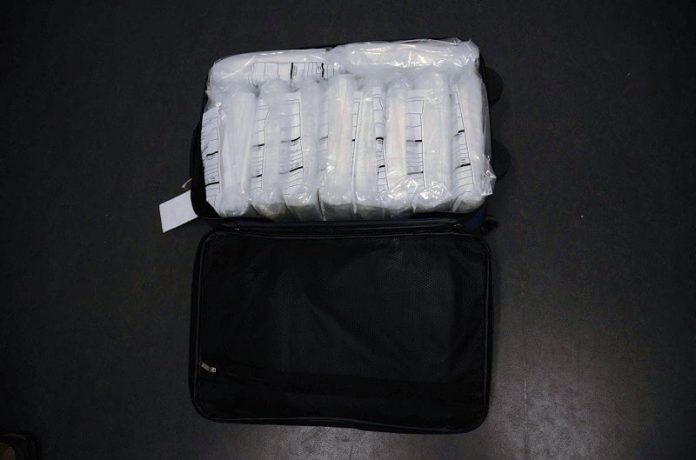GURPREET Mand of Surrey, who was charged with unlawfully importing heroin and possessing heroin for the purpose of trafficking on August 18, 2017, when 13 kilograms of heroin were found in a suitcase in the trunk of his car as he entered Canada at the Douglas border crossing, has been acquitted by B.C. Supreme Court Justice Neena Sharma.
Mand crossed into the U.S. on August 17, 2017, at Blaine, Washington, driving a Hyundai Accent vehicle, a courtesy car which was loaned to him on August 6, 2017, while one of his vehicles was being repaired.
Mand, who was a dump truck driver, testified that he crossed the border in order to meet a friend, Pirthi Sidhu, whose truck had broken down, at a rest area close to the border. After carrying out the repairs, he drove back to the border.
Canada Border Services Agency officers seized a blue suitcase from Mand’s car that contained 13 bricks of what was later confirmed to be heroin. The bricks of suspected drugs were analysed in late August 2017 by the RCMP and confirmed to be high-grade heroin. Each brick was approximately a kilogram in weight. All but two bricks had purity of over 80%. All bricks were wrapped in layers of plastic.
The RCMP tested the seized suitcase and outer wrapping from each brick of heroin for fingerprints. None of the fingerprints located on the plastic wrap around the heroin originated from Mand. The fingerprints located on the suitcase were not capable of being compared. Also, a pair of black gloves seized from Mand upon his arrest were subjected to forensic examination for drug residue, but no residue was found, according to court documents.
Mand agreed in court that when first asked why he went into the U.S., he said he went to purchase gas. However, he said that by the time he repaired the truck and visited with Sidhu, he decided not to get gas because it was so late and he had to wake early the next day for work. When asked why he did not mention fixing his friend’s truck at any time, he referred to his discomfort speaking English.
In her analysis, the judge said: “Mr. Mand testified in a straightforward manner. He never got flustered or frustrated. He agreed with reasonable propositions put to him during cross-examination, even if they were unfavourable to his position. He provided a thorough explanation of what he did in the United States, including explaining in detail more than once the route he took and the truck repair that he did. As already noted, I found his testimony to be consistent throughout despite being extensively cross-examined. In my view, his testimony had many of the hallmarks of being credible and reliable.”
She also said: “I found the reliability of the officers’ testimony to be decreased on a number of points. Importantly, both officers ultimately agreed in cross-examination that Mr. Mand’s version of a number of things said (for example, bag instead of suitcase) was possible.”
Interestingly, the ruling noted: “Crown submitted that even if I were to believe that Mr. Mand went across the border to assist Mr. Sidhu, and that he did repair Mr. Sidhu’s truck, that would not be inconsistent with his knowingly importing the heroin, perhaps at Mr. Sidhu’s behest. Crown counsel submitted the facts could fit a scenario where Mr. Sidhu’s truck did fail and he was in desperate need of finding another way to get the heroin across the border, so he persuaded Mr. Mand to come across the border and then enlisted him to take the suitcase.”
But it added: “Defence counsel asserted that submission is fatal to the Crown’s case because it substantiates Mr. Mand’s position that there is more than one inference that can be drawn from the facts.”
She also noted: “I found three aspects of Mr. Mand’s version of events to be troubling. Thus, I do not completely believe his denial of knowing about the heroin; however, I am left with a reasonable doubt about that.”
She added: “I have less doubt that he did go to the Rest Area to repair Mr. Sidhu’s truck. That being the case, I am satisfied that the evidence establishes there was opportunity for another person to put the suitcase with heroin into his car, without his knowledge.
“Accordingly, I am not satisfied that the only inference that is supported by a common-sense view of all the evidence is that Mr. Mand knew he brought heroin into Canada. Instead, I find it plausible that Mr. Sidhu, or someone working under Mr. Sidhu’s direction, put the suitcase with heroin into Mr. Mand’s car while he was repairing Mr. Sidhu’s truck at the Rest Area.”
In her conclusion, the judge said that although she “did not completely believe that Mr. Mand did not know about the heroin, I have a reasonable doubt about his knowledge. I also find on the whole of the evidence, when viewed with common-sense and logic at the forefront, that his knowledge of the heroin is not the only inference that can be drawn.”
Among other things, she noted Mand’s “testimony about what happened at the Rest Area withstood strong cross-examination and remained consistent, not only overall, but also with regard to minor details” and that “there was opportunity for someone to put something in Mr. Mand’s car at the Rest Area while he was pre-occupied with the truck repair.”
The judge found Mand not guilty of all charges.
Full ruling at: https://www.bccourts.ca/jdb-txt/sc/21/06/2021BCSC0611.htm
READ ALSO:












